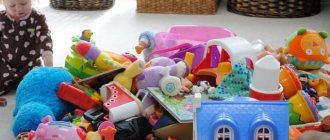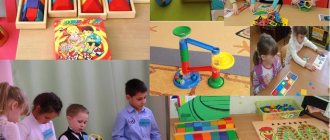The personal development of a child is the formation of qualities, values, beliefs, worldviews, relationships with the external and internal world. This process lasts throughout life, but the most active development occurs in the preschool period.
Next, we will consider the features of how to develop a child’s personal qualities and what role the family plays in this.
Features of personal development of a preschooler
Edik Erikson, a German psychologist, argued that the formation of a person’s personality begins from the first days of life. From his point of view, during the first year the foundation for diversified development is laid.
Specifics of development of a preschooler:
- active exploration of the surrounding world;
- understanding who “I am”, awareness of the boundaries between oneself and the outside world;
- interaction in society, the emergence of gaming motivation.
Already in the first year of life, the baby begins to actively explore the world, which manifests itself in the methods available to him: taste, scatter, break. Of course, this brings a lot of trouble to parents. But you need to be patient, to “survive” this period, on the one hand, and on the other hand, you need to encourage his thirst for knowledge. The main task of adults is not to suppress or “kill” interest in new knowledge.
At an early age, personal development begins with the concept of “who I am.” A striking example of this stage is the appearance of the pronoun “I” in speech. Next, the child begins to look for confirmation of his existence in action, scatters and breaks things, and perceives all toys as his own.
Children should have space and time to be alone. Parents need to learn to ask permission before entering his individual space.
The personal development of a preschooler is impossible without society. Children under 2 years of age only need to communicate with adults; by the age of 3-4 years they develop play activities, which by the age of 5 develop into role-playing games. If you limit your social circle only to adults, then a preschool child will lack social skills, will develop fear of children, and excessive attachment to parents.
Game as the main method of personality development of a preschooler
The development of a child is carried out in the course of his upbringing and the various activities that he performs. Among them the following main ones can be distinguished:
- Game activity.
- Household work. This includes a variety of household operations that can be performed by a child.
- Activities between an adult and a child. Teachers and parents organize special activities, exercises and tasks for children to complete, focused on their learning and development.
- Maintaining a daily routine. The child performs certain actions during the day that reflect routine moments: washing in the morning, brushing teeth, eating, sleeping.
Development process
Childhood is the best time for personality development. Psychologists give advice on what is best to avoid when communicating with a child:
- Manifestations of excessive demands.
- Constant control.
- Pressure and demands to perform tasks that are beyond one’s ability due to age.
Well-known child psychologist Julia Gippenreiter argues that in order to develop a personality, it is necessary to allow the child to independently cope with the tasks that he is capable of performing, and to teach him various skills as early as possible.
For successful personality development, it is important to consider the following pedagogical areas:
- Creating conditions for the formation of a sense of security and self-confidence.
- Developing an understanding that the child is heard, consulted, and takes part in the life of the family.
- Instilling responsibility for one's actions and words.
- Formation of behavior skills in society.
- Cultivating respect for elders.
- Development of skills in goal setting, planning, and prioritization.
Tips for developing a child’s personal qualities:
- We develop the desire for freedom. As a result of life observations, it turned out that freedom in activities and games leads to enterprise and activity. With strong restrictions, aggression and stubbornness are formed. In children's language it sounds like “I myself.” When a child works on something he has chosen on his own initiative, he develops self-confidence.
- We don’t say “no” to persistence. Children are constantly working, mastering new activities. They make mistakes and repeat the same thing dozens of times until they achieve results. The parents' job is not to interfere. For example, a child has just started walking and wants to get to his mother sitting opposite him. He falls, breaks away from the chair, comes back, loses his balance, crawls back. And in the end he experiences triumph, having achieved his goal. Already at this age, the baby shows persistence. It is important here not to overdo it with overprotection. Then a person will grow up who knows how to show will and perseverance in achieving a goal.
- We give you the opportunity to find your way. There is no need to send your child to one activity. For example, if you took a dance class and didn’t like it, we offer other options for classes: music, swimming, etc.
Personality development of preschool childrenconsultation
Personality development of preschool children
The leading activity in preschool age is play. However, throughout the entire age period, gaming activity undergoes significant changes.
Younger preschoolers (3-4 years old) mostly play alone. The duration of the games, as a rule, is limited to 15-20 minutes, and the plot is to reproduce the actions of those adults whom they observe in everyday life. Middle preschoolers (4-5 years old) prefer joint games, in which the main thing is to imitate relationships between people.
Children clearly monitor compliance with the rules in fulfilling roles. In middle preschool age, drawing actively develops. A schematic, x-ray drawing is typical, when something that is not visible from the outside is drawn, for example, when depicted in profile, both eyes are drawn.
Competition games are beginning to arouse active interest and help children develop motives for achieving success. An older preschooler (5-7 years old) is able to play for a long time, even for several days.
In games, more attention is paid to the reproduction of moral and ethical standards.
Construction is actively developing, during which the child acquires simple work skills, becomes familiar with the properties of objects, develops practical thinking, and learns to use tools and household items. The child’s drawing becomes voluminous and plot-driven.
The personal development of a preschooler includes: 1) understanding of the world around him and his place in this world; 2) development of the emotional and volitional sphere. The attitude of an adult towards a child largely determines the development of his personality. Younger preschoolers learn cultural and hygienic skills, daily routine, rules for handling toys and books; middle and older preschoolers - rules for relationships with other children. In preschool age, the child’s self-awareness begins to actively form, which is manifested in self-esteem. At the initial stage, the child learns to evaluate the characters of fairy tales and stories, then transfers these evaluations to real people, and only by older preschool age the ability to correctly evaluate oneself begins to develop. Throughout preschool age, feelings accompany the child's behavior.
The baby is not yet able to fully control his emotional experiences; his mood can quickly change to the opposite, but with age, feelings acquire greater depth and stability.
The “reasonableness” of feelings increases, which is explained by the acceleration of mental development.
Increasingly, one can observe the manifestation of such feelings as a feeling of joy and pride for a completed task, or the opposite - feelings of grief and shame if the task is not completed, a sense of the comic (children come up with verbal inversions), a sense of beauty. By the end of preschool age, the child in some cases manages to restrain violent manifestations of feelings.
Personality is a specific person, taken in the system of his stable socially conditioned psychological characteristics, which manifest themselves in social connections and relationships, determine his moral actions and are of significant importance for himself and those around him.
Preschool age is a stage of life that comes after early childhood and corresponds in the domestic periodization of mental development to the age from 3 to 6-7 years. At this age, children already know how to consciously manage their behavior, but because their moral feelings have greater motivating power than other motives. This allows them to defeat competing motives in a spontaneous battle not controlled by the child himself. However, is it possible to talk about a preschool child as an individual?
Many outstanding child psychologists have dealt with the problem of personality development in preschool children - D.B. Elkonin, L.I. Bozhovich, A.V. Zaporozhets, P.Ya. Galperin, V.S. Mukhina. A.N. Leontyev noted that the most important psychological new formation that arises towards the end of age is the subordination of motives. L.I. Bozhovich, developing this idea by A.N. Leontieva, emphasized that in preschool children, not just a subordination of motives arises, but a relatively stable non-situational subordination of them. At the same time, specifically human, i.e., mediated in their structure, motives become at the head of the emerging hierarchy. For a preschooler, they are mediated, first of all, by patterns of behavior and activity of adults, their relationships, and social norms fixed in the relevant moral authorities.
D.B. Elkonin pointed out that in preschool age primary ethical authorities and moral feelings are formed. The formation of ethical assessments and ideas follows the path of differentiation of a diffuse attitude, in which direct emotional attitude and moral assessment are fused together. Gradually, as a result of assimilation of the content of moral assessments, the latter are increasingly separated from the immediate emotional relationship and begin to determine it. Moral assessment is saturated with social content, including the moral content of the actions of the heroes, their relationship to other people [Based on this moral assessment, children establish a connection between the concepts of “good” and “bad”, as well as their actions, and on this basis relate their actions to good or bad.
D.B. Elkonin emphasized that managing one’s behavior becomes a subject of consciousness for the children themselves, and this means a new stage in the development of the child’s consciousness. The formation of self-awareness, which in a preschooler is most clearly manifested in self-esteem and comprehension of one’s experiences D.B. Elkonin considered the most important personal new formation of age.
The emergence of will as the ability to control behavior plays a special role in the development of personality. As shown above, D.B. Elkonin associated arbitrariness of behavior with the subordination of motives and the emergence of primary ethical authorities. V.S. Mukhina connects the emergence of will with:
- development of purposefulness of actions (the ability to keep the goal in the center of attention);
- establishing the relationship between the purpose of actions and their motive;
- increasing the regulatory role of speech in performing actions
In preschool age, there is a shift in affect (emotional image) from the end to the beginning of an activity. Affect becomes the first link in the structure of behavior. The mechanism of emotional anticipation of the consequences of an activity underlies the emotional regulation of a child’s actions.
During this period, the structure of the emotional processes themselves also changes: in addition to vegetative and motor components, complex forms of perception, imaginative thinking, and imagination now also include. The child begins to be happy and sad not only about what he is doing at the moment, but also about what he still has to do. Experiences become more complex and deeper.
The development of the emotional sphere is associated with the formation of a plan of ideas. The child’s figurative ideas acquire an emotional character, and all his activities are emotionally intense.
The most complete structure of psychological age, which includes the child’s personal developments, is presented in the theory of cultural and historical development by L.S. Vygotsky and his school.
According to this theory, psychological age is determined by:
- social situation of development;
- leading activity;
- contradictions of development crises;
Child development must be considered as a continuous transition from one age stage to another, associated with changes in the child’s personality. There comes a time when the child’s increased capabilities, his knowledge, skills, and mental qualities begin to contradict the existing system of relationships, lifestyle and activities. In other words, a contradiction arises between the child’s new needs and the old conditions for satisfying them.
The emergence of personal new formations, which are the fourth component that determines the psychological age of a child, is caused by the interaction of the social situation and the leading type of activity through the resolution of the contradictions of the crisis period. The basic personality characteristics of a preschooler include:
- Arbitrariness. Considered as one of the forms of volitional behavior, the ability to control one’s behavior in accordance with norms and rules. On this basis, a subordination of motives arises.
- Independence. Provides the opportunity to pose and solve life problems without the help of an adult. The most important factor influencing the development of independence is the style of communication between a child and an adult.
- Initiative. This is one of the indicators of the development of children's intelligence and cognitive activity.
- Creativity. Directly related to the level of development of thinking, memory, imagination, perception, awareness of the child, as well as the arbitrariness of his behavior.
- Freedom of behavior. A child who is confident in his abilities is able to independently make a choice of means and ways to achieve a certain goal. Freedom, understood in a positive aspect, allows the child to respect himself and others and take into account their opinions.
- Safety behavior. It is based on an understanding of cause-and-effect relationships and the assimilation of socially determined prohibitions as protecting the life and health of the child.
- Responsibility. Associated with the development of the emotional-volitional sphere of the child. The development of a child’s responsibility for his actions is facilitated, first of all, by his experiencing the consequences of his actions in relation to other people.
- Self-awareness.
Basic personality characteristics are dynamic and specific to each age stage of development. Their timely occurrence is the key to the successful development of the child.
At preschool age, children already know how to consciously manage their behavior, but because their moral feelings have greater motivating power than other motives. This allows them to defeat competing motives in a spontaneous battle not controlled by the child himself. In other words, preschool children are characterized by a kind of “involuntary voluntariness,” which ensures the stability of their behavior and creates the unity of their personality.
The age from three to seven years is the initial formation of personality. The emergence of emotional anticipation of the consequences of one’s behavior, self-esteem, the complication and awareness of experiences, the enrichment of new feelings and motives in the emotional-need sphere - this is an incomplete list of features characteristic of the personal development of a preschooler. The central new formations of this age can be considered the subordination of motives and self-awareness.
This characterizes a new stage in the formation of a child’s personality, a stage that allowed A.N. Leontyev speaks of preschool age as a period of “the initial, actual personality structure.”
In preschool age, the child’s motives and desires begin to form a hierarchy, arbitrariness appears, and impulsive actions are replaced by behavior mediated by norms, rules, and self-esteem.
By the end of preschool age, the child develops a more realistic self-esteem and awareness of his place in the system of social relations.
The hypothesis posed during the study was confirmed - it was established: in preschool age, socially conditioned psychological characteristics develop, i.e. personality development occurs.
The role of the family in the development of personal qualities
Soviet psychologist Lev Vygotsky believed that the fundamental role of personal development during childhood is given to the family.
The child learns the patterns of relationships that he observes within the family. The main factor on the path to personality development is the intrafamily emotional climate.
Let's consider the main types of relationships in the family, and what impact they have on the personal sphere of child development:
- Diktat that suppresses family members. The peculiarity of this type is the destruction of initiative. Authoritarianism is an obstacle and does not allow children to develop personality.
- Guardianship. Parents take on all the difficulties, providing literally all the child’s needs, completely protecting him from worries. As a result, an unindependent and uninitiative personality is formed.
- Non-interference. This is a passive parenting style, in which it is not easy to predict the child’s personality. This may be an impulsive and aggressive person, as well as overly anxious and insecure.
- Cooperation. It manifests itself in the setting of common tasks, goals, and joint activities.
German psychologist Erika Erikson believed that if during the first year of life all the child’s needs are met, including physical and emotional contact, then in the future a personality with a high level of trust in the world will be formed. If during the first years of life children were deprived of care and communication, then they develop an attitude that the world is unfriendly for the rest of their lives.









